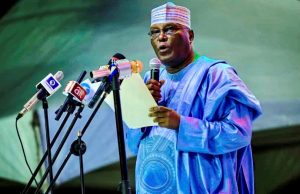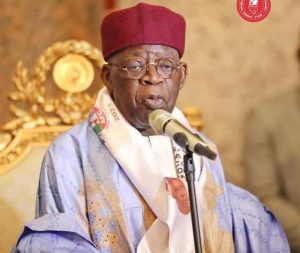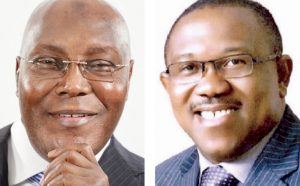The point is that the presidential candidates of both the All Progressives Congress, (APC) and the People’s Democratic Party, (PDP) have totally captured the political space, overwhelming the state itself in that process. Their seizure of the space is so complete as to have left those who do not share their political practices in a state of alarm and the associated responses. One of the responses is the mediation of Peter Obi as an alternative. In this respect, Peter Obi is no longer just a youthquake, he is also an issue in Left politics.

Can his machine be stopped on its tracks?
Thus, in contrast to the first installment of this series (titled, Indeed, God’s Own Electoral Riddle for Nigerians: Choosing From Asiwaju, Atiku, Al Mustapha, Kola Abiola, Peter Obi & Kwankwaso) which devoted a lot of attention on the two rainmakers – Atiku Abubakar and Asiwaju Tinubu, this installment will largely be on the Others, mainly Peter Obi. The Left dimension of the attempt at radical re-mediation of Obi presents theoretical and ideological puzzles to warrant Interventionism.
Why would a Left establishment become interested in the candidature of a right wing element in a multiparty democracy? And what does that speak to about such a Left establishment, theoretically and organisationally?

Surrounded by his own variant of Leftists, can the radicals stop the Asiwaju?
The central contention here is that while, organisationally, the Left infatuation with Peter Obi suggests a Left in disarray, it does not violate any tenets of broad Left politics in theoretical terms. The problem, however, is that majority of Left politicians in Nigeria subscribe to Dialectical Materialism, (DM) rather than Deconstructive reasoning. The problem with jumping for Peter Obi’s presidential candidateship of the Left structured Labour Party is thus only in so far as DM cannot explain or justify it. Otherwise, there is a basis in radical democratic politics within which it is tactically acceptable to absorb a Peter Obi and pose him as a leader. When there is a more threatening situation in the political battlefield, it makes tactical sense to bring together all other forces opposed to such a considered danger or threat and try to build a fighting block. These diverse forces do not have to subscribe to a same tendency as long as they share a broad outlook or are all tied together by a sense of threat from the danger so perceived. This is the Hegemony and Socialist Strategy approach that does away with working class essentialism in postmodern struggle for alternative systems to capitalism at a time when capitalism has produced so many sites of alienation beyond class but all of which can see that origin of their fate.
For those who share this paradigm within the broad Left, re-articulating and re-constituting Pater Obi as Leader of the Left structured Labour Party fits into a strategy that says that neither Peter Obi nor anybody else has a core which is above contingent re-contextualisation and meaning outside of space and time. It does not mean a failure to reckon with the associated contradictions but it argues the possibility of overcoming of such contradictions in so far as the social space itself is discursive.
This means that it is Dialectical Materialists who have to worry about the theoretical and ideological propriety of romanticizing a Peter Obi, erroneously calling it “the meeting point of marine water of the sea and the freshwater of a river” as in one of the pieces on that issue has it. The two variants of water cannot meet and mix mechanically and survive the contradictions. That statement did not take into cognisance the fact that the elements in the British Labour Party who pushed the party to ‘new labourism’ did not come from outside of that party. They were party ideologues who were re-interpreting new developments in world affairs from a prism that differed from traditional ideological considerations. Peter Obi is not covered by that category.

Then
In that case, the question arises as to whether an Atiku Abubakar’ s Vice-presidential pair yesterday can be successfully baptized today as a good fit inheritor of the legacy just because he now weaves around some neo-populist rhetoric? Would that not mean that enterism is now suddenly approved in Marxist politics in contrast to the earlier stand on this?
Would such a move have considered the danger in investing a self-made man like Peter Obi and a product of Wharton Business School with the challenge of superintending the operationalisation of emancipatory turn-around in Nigeria? Wharton Business School does not groom its products to undermine or humanize capitalism but to manage it so efficiently as to mask the structural violence therein and make the quest for alternatives pointless.
Doesn’t the Nigerian Left risk an embarrassment if it is not careful? A Nigerian president of Igbo origin might not occur in 2023 but it is only a matter of time. A Peter Obi could remain a major contender in that contest. The Nigerian establishment would most likely not allow him easy passage to the Presidency without some debriefing. Should a faction of the establishment such as Atiku Abubakar’s re-capture Peter Obi back into the fold in this process, however it does this, wouldn’t the Left be so exposed as lacking in any serious criteria of recruitment of leaders and leadership? Wouldn’t the Left be too stranded, left high and dry in the idea of making a Left of a Peter Obi?
How come is the Left, (more appropriately, the fraction of it that is happy with Peter Obi take-over of the Labour Party) not worried that the youth-quake foregrounding what looks like a Peter Obi moment has its own terrifying contradiction. This is in the sense that a youth quake excited by what it cannot name must be so. A lot of the Obi rhetoric that presents him to his audiences as a critique of prolificacy or wastefulness in Government advertises a lack of rigour or appreciation of the different dimensions of the ‘social contract’, the ‘umbrella’ character of the state, (in its generic sense) and even the logic of logic of the Government House, for instance. Yet, that is the reality in Nigeria. Peter Obi could go on and win the presidential election in 2023 on the strength of a youthquake but should that possibility be defining Left aspirations for Nigeria for those who approach that agenda from rigid working class standpoint?
As things are now, Peter Obi can help his struggle for power if he stabilizes in a political party and if he tries to eschew the parts of his rhetoric that doesn’t show depth in statecraft. But no one should forget the possible re-alignments before and during the impending campaigns.

PRP’s Presidential candidate, Kola Abiola
It is in that sense that candidates such as Kola Abiola of the People’s Redemption Party, (PRP) could win the 2023 presidential race. What happened in Kaduna in 1978/79 can happen again on a national scale. All the other parties came together in Kaduna State in 1979 against the hegemonic National Party of Nigeria, (NPN) to produce a radical activist as the governor. That is how Abdulkadir Balarabe Musa became the governor of the state. But this happened too late, translating to a governor left with a hostile legislature that made consolidation of power impossible.
The hope is that ideologues and strategists contemplating such an option in 2023 would start early so that there is no repeat this time. The degree of decay in Nigeria today would not support even a one-minute glitch in the transition process. The assumption is that all players in this game appreciate the extra-ordinary difficulty of the period between now and May 2023 and the need to avoid paralysis of any type in responding to the crisis of quality of leading candidates and what to do about that.
The Left can make a difference but it has to decide which frame of reference can give it the clarity to move into combat positions and produce the outcome it wishes. Is it the dialectical ontology cum epistemology or the belief in in quickly permeating the society through a hegemonic articulation of whoever it wants as president?




























